Related Research Articles
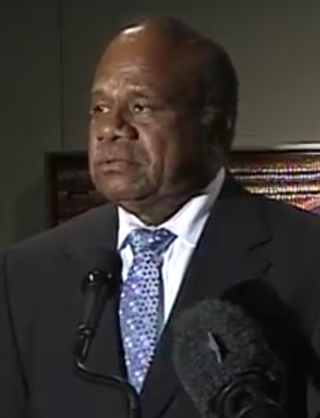
Sir Rabbie Langanai Namaliu was a Papua New Guinean politician. He served as the fourth prime minister of Papua New Guinea from 4 July 1988 to 17 July 1992 as leader of the Pangu Party.
Kainantu is a town in the Eastern Highlands of Papua New Guinea. It had some historical significance as an airstrip town during WWII. It functions primarily as a market town for local produce growers and cash croppers. It is located on the "Highlands Highway" approximately 170 kilometres (110 mi) by road west of Lae and 90 kilometres (56 mi) by road east of Goroka. It is 11 kilometres (6.8 mi) approx from a nearby missionary station Ukarumpa and is nearby the Aiyura valley. Kainantu has basic facilities such as a school,hospital,police station,district court,and service stations.
The United Party is a political party in Papua New Guinea. As of May 2019,it has one seat in the National Parliament and is led by Minister for Foreign Affairs,Rimbink Pato.
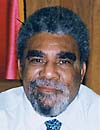
Sir Mekere Morauta was a Papua New Guinean politician and economist who served as the 7th Prime Minister of Papua New Guinea from 1999 to 2002. Inheriting a depressed economy and a fractious legislature,he embarked on fundamental reforms of the country's economy and political system.
Arthur Somare is a former Member of the National Parliament of Papua New Guinea (PNG). He represented the electorate of Angoram Open in East Sepik province for the National Alliance Party from 1997 until he lost in the 2012 general elections.
The New Generation Party is a political party in Papua New Guinea.
Sir Salamo Injia is a retired Judge and former Chief Justice of Papua New Guinea. Injia was knighted in 2006 and appointed Chief Justice of the Supreme Court of Papua New Guinea in 2008,succeeding Mari Kapi. In 2018,Sir Gibbs Salika replaced him as the Chief Justice of Papua New Guinea. In August 2019,Injia was appointed chair of a commission of inquiry into a controversial state loan of US$1,200,000,000 from the Swiss bank UBS used by the PNG government to buy a stake in the resource company Oil Search.
Kiaps,known formally as district officers and patrol officers,were travelling representatives of the British and Australian governments with wide-ranging authority,in pre-independence Papua New Guinea.
Peter Wararu Waranaka is a Papua New Guinean politician. In 2004 he was elected Member of Parliament for Yangoru-Saussia for the National Alliance Party and was appointed the Governor of East Sepik. The National Court had initially nullified Waranaka's election,after it was contested by Gabriel Dusava,but his victory was later confirmed.

The 2012 Papua New Guinea Defence Force mutiny took place on 26 January 2012 when a group of military personnel headed by retired Colonel Yaura Sasa took the commander of the defence force,Brigadier General Francis Agwi,prisoner. The mutiny was related to a dispute over the prime ministership between Sir Michael Somare and Peter O'Neill which had begun in December 2011 when the Supreme Court of Papua New Guinea ordered that Somare be reinstated as the prime minister while the country's parliament supported O'Neill.
Investigation Task Force Sweep was established in Papua New Guinea (PNG) on 12 August 2011,following a resolution by the National Executive Council (NEC). The initiative was spearheaded by Prime Minister Peter O'Neill as part of his well-publicised anti-corruption drive.
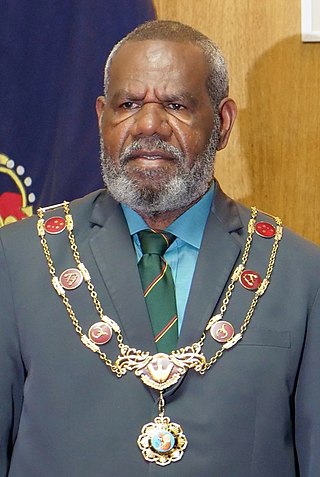
Sir Bob Bofeng Dadae is a Papua New Guinean politician currently serving as the tenth governor-general of Papua New Guinea since 2017.

Samuel H. Basil was a Papua New Guinean politician. He was a member of the National Parliament of Papua New Guinea from 2007,representing the electorate of Bulolo Open,until his death in 2022. From 8 June 2019,to August 2019 Basil served as the Treasurer of Papua New Guinea.
Bire Kimisopa is a Papua New Guinean politician. He was a member of the National Parliament of Papua New Guinea from 2002 to 2007 and from 2012 to 2017,both times representing the seat of Goroka Open. He was Minister for Internal Security (2003–2006) and Minister for Justice (2006–2007) in Michael Somare's third government. He was the leader of the United Party from 2002 to 2007 and leader of the New Generation Party from 2016 to 2017.
Sir Cecil Abel (1903–1994) was a missionary,teacher and politician,initially in the Territory of Papua and,from 1975,in the independent nation of Papua New Guinea (PNG). He played an important role in the independence process and is said to have been responsible for the preamble to PNG's constitution. He also played a leading role in the early stages of the Pangu Party,the party that formed the government under prime minister Michael Somare after independence.

Sir Joseph Nombri was a politician,administrator and diplomat in Papua New Guinea (PNG). He played an important role in events leading up to PNG's independence in 1975 and later became the country's ambassador in Tokyo.

Sir Pita Lus was an outspoken Papua New Guinean politician who played an important role in the country's independence in 1975 and is credited with having persuaded Michael Somare,the country's first prime minister,to run for parliament.
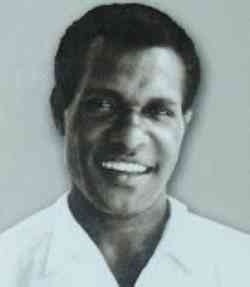
Sir Ebia Olewale (1940–2009) was a politician in Papua New Guinea (PNG). He was elected as a member of the House of Assembly of Papua and New Guinea in 1968 and went on to hold several ministerial positions during the period of self-governance and after PNG's independence in 1975,including that of deputy prime minister. He was knighted in 1983 and served as chancellor of the University of Goroka from 2000 to 2006. From 2002 until his death,he was a director of the Papua New Guinea Sustainable Development Program.
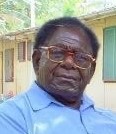
Sir Ronald ToVue was a founding member of the Pangu Pati of Papua New Guinea (PNG),which formed the first government of the country after its Independence. He went on to become the premier of East New Britain Province from 1981 to 1989,as well as a successful businessman.

Leader of the Opposition is a constitutionally sanctioned office in Papua New Guinea. It originates from Westminster role for a leader of the opposition.
References
- ↑ "Barry Blyth HOLLOWAY", Courier Mail, 18 January 2013
- 1 2 3 4 5 "PNG’s first speaker dies in Brisbane", Radio New Zealand International, 17 January 2013
- ↑ "Barry Blyth Holloway championed PNG independence". The Australian. 26 January 2013.
- 1 2 Holloway, Damien. "The passing of Sir Barry Blyth". Tasmania 40 Degrees South Facebook page. Retrieved 8 March 2014.
- 1 2 Barker, Paul (18 January 2013). "Papua New Guinea is mourning the death of one of its most respected elder statesmen, an Australian who arrived as a teenager and never left". Radio Australia. Retrieved 8 March 2014.
- ↑ KELOLA, TODAGIA (19 January 2013). "EX-KIAP NETWORK FORUM" . Retrieved 8 March 2014.
- ↑ Pople, Graham. "Barry Holloway RIP 16/1/2013". EX-KIAP NETWORK FORUM. Retrieved 8 March 2014.
- 1 2 3 Brij V. Lal and Kate Fortune (eds.), The Pacific Islands: an encyclopedia, University of Hawaii Press, 2000, ISBN 0-8248-2265-X, pp.310–311
- ↑ "PNG's first speaker of parliament dies" Archived 24 January 2013 at the Wayback Machine , AAP, 17 January 2013
- 1 2 3 4 5 6 Baker, Mark (31 January 2013). "An affair to remember". The Sydney Morning Herald. Retrieved 13 December 2024.
- ↑ Malum Nalu (20 January 2013). "Highlands farmers pay tribute to Sir Barry Holloway". Malum Nalu. Retrieved 8 March 2014.
- ↑ Farmset. "Home - Global Internet" . Retrieved 8 March 2014.
- ↑ "Case study: Vital support for PNG agribusiness". Business Advantage PNG. 1 September 2012. Retrieved 8 March 2014.
- 1 2 3 4 Baker, Mark (31 January 2013). "An affair to remember". The Sydney Morning Herald. Retrieved 13 December 2024.
- ↑ "No. 46594". The London Gazette (Supplement). 6 June 1975. p. 7403.
- ↑ "No. 49587". The London Gazette (Supplement). 30 December 1983. p. 43.